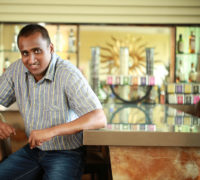By Uditha Devapriya
Madura Kulatunga is a familiar name to most Sri Lankans. He is not too young but he hasn’t mellowed with the passing of time. He exhibits a kind of naïveté that is, for this writer at least, attributable to a sense of simplicity that he’s acquired and nurtured over many, many years. That simplicity has won him both friends and enemies. This writer met him recently. He had some questions to ask. Madura answered them all.
To start off things Madura, tell us a little bit about your childhood and youth.
Well, I was born on March 23, 1980 in Matara. I eventually entered Royal College. People think that kids my age would have begun our love for computers at school, but that’s not really true. Royal had a Computer Society, yes, but all too often there was a discrepancy between those who had access to computers at home and those who had not. This was in turn based on family backgrounds. Besides, schools couldn’t invest too much on the subject at the time. For that reason, I had to look beyond the Society to sustain my love for computers.
That is why my friends and I used to jaunt off to Union Place every day, to an internet cafe where I enthralled myself by surfing the web. You’d be surprised to know that I didn’t really choose computing for my A Levels at Royal. I chose Commerce. Perhaps that helped me when I was formulating a business model for my program later on, but for that time we really didn’t have much of an option: it was either Science or Commerce.
What of your life after school?
After doing my A Levels in 1999, I got myself enrolled for the National Diploma in Computing at the National Youth Centre in Maharagama. That was followed by a course, though not as celebrated or acclaimed, at Abacus Computers, Nugegoda: the Special Diploma in Information Technology. It was at Abacus that I realised by weakest spot: my lack of proficiency in English. Needless to say, I tutored myself through the dictionary, mainly the Malalasekera Dictionary, and through a perusal of several books on the subjects I was learning.
So did these encounters help you formulate your program?
I would say so. I studied about Visual Basic from these extra books I bought from Sarasavi Bookshop. They pushed me to design a program. At the time, however, access to computers was a luxury and so was access to the internet. So I had to design a program that could be contained in a CD. That is how I came by the idea of designing a Sinhala to English Dictionary. I admit that Malalasekera helped me a lot when I first set about setting up and conceiving my program.
Eventually I finished designing it. To test it, I asked some of my friends to run it on their computers and get back to me. They loved it. Because I was so encouraged by their response, I released the dictionary. I remember the date as though it were yesterday: November 23, 2002. I also remember the many costs and profit margins I aimed at with it.
For printing the CD cover at Seya Colour and packaging it, I had to spend about 75 rupees. I sold the program for 200 rupees to a retailer who then marketed it for 300. My profit, after all that, amounted to 125 rupees, which had to take into account various capital equipment, including a CD writer that cost 10,000 rupees. Money was not a concern or priority, though. The program became the roaring success I wanted it to become. That was enough.
What of your subsequent accomplishments?
Well, six years later, in 2008 to be specific, I made a website out of my program, which basically released it to the public domain. Soon enough, it became a roaring success on its own right.
I also pursued my education. I passed out as a Microsoft Certified Systems Engineer in 2005. I obtained an MSc in Information Technology from Sikkim Manipal University (through ICBT Campus) five years later. I was then recognised by the University of Moratuwa in 2009, when I was invited to address a Symposium by Professor Gihan Dias (who was instrumental in founding Sri Lanka’s first email system). Regarding the latter event, I must mention that I was able not just to present my program superficially, but also to unearth the nuts and bolts that went into the conception of that program.
Regarding all those accomplishments, what can you say as a final note?
Well, when I started out, I did not forget to acknowledge the products that and people who helped me design my dictionary. I did not forget Malalasekera, nor have I forgotten the intense abuse of it that most people who copy my original program even today indulge in. That is why I say that you must not forget your roots, your background. Also, you must not regard your accomplishments as reason for complacency. Though I will not reveal it entirely, I will say here that my ambition now, after completing all those Diplomas and Degrees, is to become a pilot. I have enrolled in a course to help me realise that ambition.
Do I have reason for regret in what I have done? Not by a long shot. Have I lost anything materially? Perhaps. Do I care? Of course not. So all in all, I can say this much as a final note: do what you can, improve on what you want to do, and everything else will follow. Don’t do anything for the love of profit. That is all.
